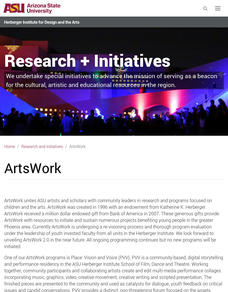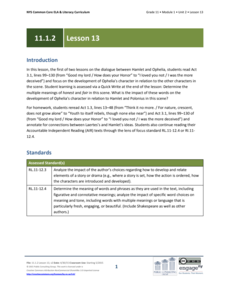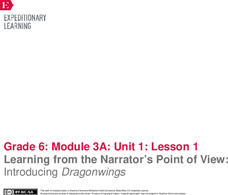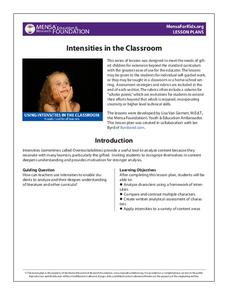Curated OER
Creating Plays from Children's Stories
Students explain how individual elements (e.g., plot, theme, character, conflict, etc.) comprise the structure of a play. They write an original one-act play with developed characters, specific setting, conflict, and resolution.
Curated OER
This Was the Noblest Roman of Them All
High schoolers analyze the problems with staging and character using the play Julius Caesar. They summarize the final scene of the play and view film versions of the scene. Additionally, they prepare a promptbook for the final scene and...
Curated OER
Shizuko’s Daughter: Graphic Organizer
Help young readers align character relationships in an activity for Kyoko Mori's Shizuko's Daughter. After kids discuss the characters and how they relate to each other, they use index cards and a graphic organizer to outline the...
Curated OER
Character Development Through Song
Learners use songs to analyze their sense of identity and self-worth. In groups, they discuss and explore their own character development and discover how far they have come in recent years. They also identify the positive and negative...
Curated OER
Introduction To Literary Analysis
Explore the fascinating ways in which authors use specific literary devices to create interesting and realistic texts. Using non-fiction articles with the subject of rogue waves, an excerpt from The Perfect Storm, by Sebastian Junger,...
Curated OER
Biopoem: Bud, Not Buddy
Young poets focus on one character from a story they are reading, collect details, and use a biopoem template to analyze this character. The activity can be used with any text.
Curated OER
Breaking Down Books
Learners practice their reading comprehension by analyzing and discussing books with their classmates. They record their responses to comprehension, evaluation, and interpretation questions provided on a worksheet that is referenced but...
National Endowment for the Humanities
Dostoevsky's Crime and Punishment
Pain and suffering do not have to be inevitable in a study of Crime and Punishment. A carefully scaffolded lesson introduces readers to the divided natures of the characters in Fyodor Dostoevsky's complex novel. Groups use the...
Student Achievement Partners
Eleven
Turning 11 comes with a range of emotions. Explore those emotions by reading the short story "Eleven" by Sandra Cisneros. Readers analyze the main character's reactions to the events of her day. Then, they write an essay describing what...
Education Oasis
Creative Writing Unit: Analyzing, Interpreting, Discussing and Writing Various Genres of African-American Literature
A six-week unit takes high schoolers through various works of African-American literature, including poems, plays, and short stories. The lesson plan format includes a week-by-week description of activities, goals, materials, and...
K20 LEARN
Locating Archetypes in Pop Culture, Literature, and Life
Archetypes help readers connect literature to the world around them. A lesson plan uses elements of pop culture to teach about archetypal traits of common characters and discuss issues of perception and other literary devices. At...
Literacy Design Collaborative
Identifying Points of View through Character Responses in R.J. Palacio's "Wonder"
Readers examine the book Wonder by R.J. Palacio to determine how characters respond differently to situations and events. Readers annotate and analyze the text and carry out group discussion using accountable talk. They work in small...
EngageNY
Grade 11 ELA Module 1: Unit 2, Lesson 21
Rest in peace, Ophelia! Scholars read about Ophelia's burial in Act 5.1 of Shakespeare's Hamlet. They complete a Quick Write to analyze the characters' reactions to Ophelia's death.
EngageNY
Grade 11 ELA Module 1: Unit 2, Lesson 6
How does Shakespeare develop the characters of Laertes and Ophelia in Hamlet? Scholars complete a Quick Write to answer the question. They also continue reading and discussing the first act of the play.
EngageNY
Grade 11 ELA Module 1: Unit 2, Lesson 13
What impact does word choice have on character development? Using the resource, scholars read Act 3.1 from Shakespeare's Hamlet, focusing on the development of Ophelia's character. They also complete a Quick Write to analyze the meaning...
EngageNY
Author’s Craft: The Poetry of the Play
Feel the rhythm! Pupils begin reading Act 2, Scene 1 of Shakespeare's A Midsummer Night's Dream as they continue participating in a drama circle. With discussion, they examine Shakespeare's use of rhyme, rhythm, and meter, analyzing how...
EngageNY
Learning from the Narrator’s Point of View: Introducing Dragonwings
Journey into the past with Laurence Yep's Dragonwings. Scholars complete anchor charts to analyze techniques the author uses to develop the narrator's point of view in his novel. As they read, pupils also complete word catchers to...
J. Paul Getty Trust
Expressing Emotions through Art Lesson 1—Everyone Shows They Care
In a instructional activity that explores art and emotions, scholars analyze a piece of art and discuss which emotions it portrays. They go on to reflect on their own emotions and how they are similar to the feelings expressed...
Penguin Books
A Guide to the Works of Jacqueline Woodson
The works of Jacqueline Woodson introduce readers to diverse characters and themes. A guide covers many of the author's best-known books such as Brown Girl Dreaming and Locomotion. Dive & Discuss and Explore & Extend activities...
Curated OER
Language Arts: Character Comparison
Fourth graders, using Kidspiration, compare and contrast the two main characters from Tales of a Fourth Grade Nothing. They use a teacher-created template to describe their characters. Students then create their own character analysis.
Curated OER
Character Cluster
Third graders practice identifying characters and story elements by creating a character cluster in class. For this story analysis lesson, 3rd graders discuss the story Snow White and identify the characteristics of the evil witch....
MENSA Education & Research Foundation
Intensities in the Classroom
Everyone learns and experiences life differently. A set of lessons about character intensities encourages middle and high schoolers to analyze themselves, their peers, and characters from a book based on the five listed intensities:...
Novelinks
The House on Mango Street: List-Group-Label
Encourage close reading of the text and a focus on how Sandra Cisneros' develops her characters with an activity that asks teams to sort, group, and label character descriptions from The House on Mango Street.
Curated OER
Comparing Characters Across Two Short Stories
Ninth graders listen to a read aloud of two short stories focusing on literary devices. The write about the settings and realism of the stories, and decide each main character handles the conflict he faces with nature.
Other popular searches
- Analyzing Characters Mystery
- Analyzing Characters Notes
- Analyzing Characters Buck
- Analyzing Characters Paper























